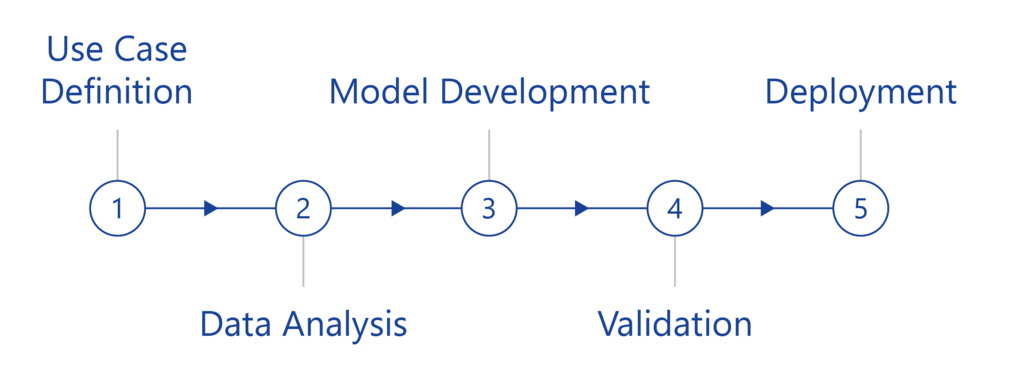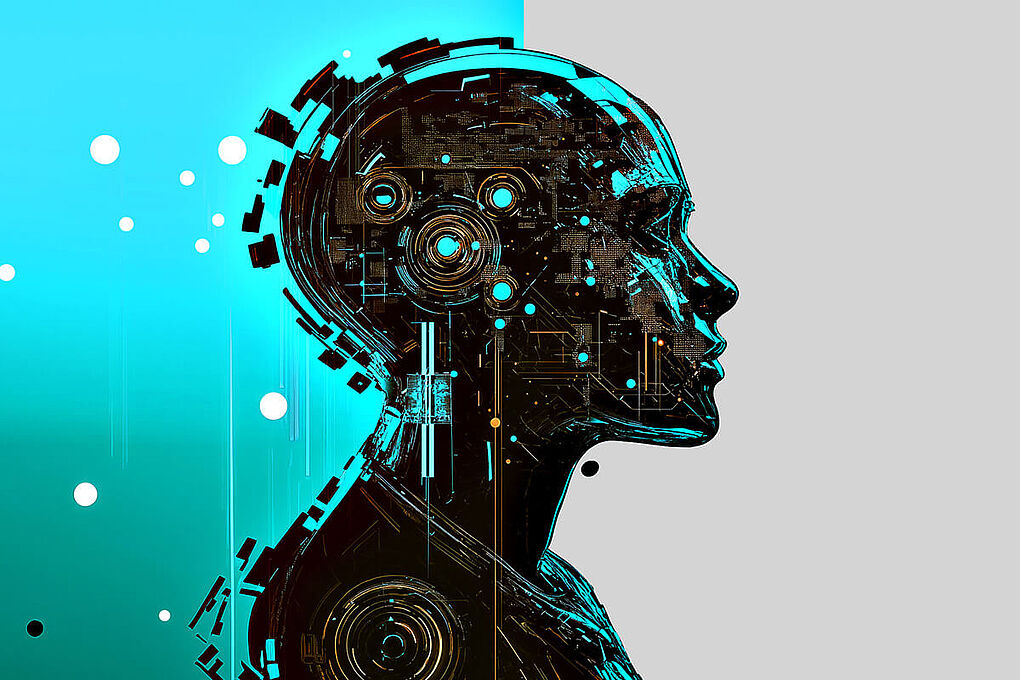Using Artificial Intelligence to its Full Potential
Whether data-driven forecasts, quality control in manufacturing, or assistance systems for complex documentation: we develop AI solutions for you that integrate seamlessly into your processes and create measurable added value. Our systems recognize patterns, make predictions, and automate processes — for lower costs, higher quality, and faster market success.
- Greater efficiency: Processes run faster, are automated, and conserve resources.
- Prompt innovation: Ideas can be tested quickly and put into practice.
- Sustainable growth: AI becomes a permanent success factor.
This requires more than just technology. We help you identify the right AI potential in your company. In addition, we bring ideas to life in no time at all through the rapid development of AI-driven applications: We accompany you from the identification of suitable use cases to the development of initial prototypes and minimum viable products (MVP) to the productive introduction of your tailor-made AI solution – so you benefit immediately from concrete results that pay off directly in your everyday work. And to ensure that this success is long-lasting, we empower your team to use and further develop AI solutions independently.
Our solutions cover the entire AI spectrum – from data-driven predictions and computer vision to language models. The result is practical artificial intelligence that advances both your processes and your offerings. In addition to short development cycles, we rely on close cooperation with your subject matter experts and technological excellence. Let's put your AI projects into practice quickly and effectively – together.
Data-driven predictions
- Classification:
Assigning categories or labels to data points using artificial intelligence, e.g., anomaly detection in log files.
- Time series forecasts:
Prediction of events or values based on historical data, e.g., for planning maintenance cycles.
- Regression:
Forecasting of continuous values, e.g., remaining range of batteries in electric vehicles.
Computer Vision
- Image classification:
AI-based assignment of labels to images, e.g., for the detection of diseases in MRI or X-ray images.
- Object/pattern recognition:
Identification of individual objects or patterns in images, e.g., defect identification or visual quality control.
- Image segmentation:
Division of images into regions, e.g., for the recognition of roads, vehicles, and pedestrians in autonomous driving environments.
Natural Language Processing (NLP) & Large Language Models (LLMs)
- Sequence-to-sequence tasks:
Artificial intelligence for transforming texts into other texts, e.g., for chat-with-your-data, document automation, or digital assistants.
- Intelligent assistants:
Presenting tool/company knowledge in an understandable way and answering questions precisely – whether for employees or customers.
- Reviewing complex texts:
Using AI to analyze documents, summarize content, or provide recommendations for action, e.g., reports for audits or documentation for compliance with standards.
Optimization of the battery management system with AI at ElringKlinger
ElringKlinger AG, a leading provider of battery technologies, is working with MicroNova to optimize the calculation of the state of charge (SoC) of batteries using machine learning methods. An evaluation of various learning approaches conducted by MicroNova served to identify potential improvements to ElringKlinger AG's battery management system.
AI-powered assistant for complex workflows
We are developing an intelligent assistant that simplifies complex processes. A natural dialogue interface allows users to access functions and information more quickly, perform routine tasks more efficiently, and find their way around new systems more easily. The assistant is based on modern language models (e.g., GPT from Azure OpenAI), combined with methods such as prompt engineering and retrieval-augmented generation (RAG). This enables the assistant to provide accurate, context-sensitive answers, making it a smart companion in everyday work.
- For which use cases are AI solutions useful?
- What data is required for an AI project?
- What infrastructure is required?
- Which individuals should be involved in defining a use case?
- What technologies are used in AI projects?
- How is it ensured that the solution will work in the long term?
- How does a typical AI project work?
- How soon can initial results be expected?
- How far along does my company need to be to start an AI project?
For which use cases are AI solutions useful?
AI is worthwhile in a wide range of data-based applications for companies of all sizes—whether in production, service, logistics, energy, or administration. The decisive factor is whether there are processes that can be measurably improved through automation, predictions, or data analysis.
How does a typical AI project work?
A project usually starts with the joint definition of the use case. We then develop a functional prototype (MVP) in short cycles to demonstrate feasibility. Based on this, we optimize the solution, integrate it into existing systems, and support its productive introduction.
How far along does my company need to be to start an AI project?
Initial projects can start with manageable amounts of data. It is important to be open to using data in a structured way and integrating new technologies into existing processes. We support you every step of the way, from the basics to a productive solution.
Which individuals should be involved in defining a use case?
Ideally, you should bring in subject matter experts (e.g., process or domain owners) and technical contacts (e.g., IT or data owners). The subject matter experts know the challenges and goals, while the technical experts know the data situation and integration options. This combination ensures that use cases are both business-relevant and technically feasible.
What infrastructure is required?
That depends on the use case. Some prototypes run locally or in a test environment; other projects benefit from cloud resources or special hardware components (e.g., GPUs). We select the infrastructure so that it fits your existing IT landscape and is scalable in the long term.
What data is required for an AI project?
That also depends heavily on the application: forecasts require historical data, computer vision projects require image or video data, and NLP applications require text or documents. One of the strengths of AI is that the data does not necessarily have to be structured in advance. We provide support in analyzing the available data, preparing the data sets, and filling in any gaps.
How soon can initial results be expected?
Thanks to our MVP-oriented approach, we often deliver initial prototypes within a few weeks. The specific timeframe depends on the use case, data quality, and integration requirements.
What technologies are used in AI projects?
We work with a wide range of modern technologies—from cloud infrastructures and machine learning frameworks to specialized processes in areas such as computer vision, natural language processing, and retrieval-augmented generation (RAG). The tools and platforms we use always depend on the specific application. Our goal is to select the technologies that best suit our customers' requirements and existing IT landscape.
How is it ensured that the solution will work in the long term?
In addition to pure development, we place great importance on knowledge transfer, documentation, and training. This enables our customer teams to use, maintain, and further develop their solution independently. We also provide support with monitoring and optimization during operation, as well as additional development services, if required.
MicroNova's AI experience – your advantage
MicroNova's AI expertise team combines many years of experience in artificial intelligence and software development with interdisciplinary know-how. This results in tailor-made solutions that can be seamlessly integrated into existing systems and create real added value.
Talk to us – together we can harness the potential of AI for your company.
MicroNova AG
Consulting
Unterfeldring 6
D-85256 Vierkirchen
Tel.: +49 8139 9300-0
Fax: +49 8139 9300-80
E-Mail: consulting@micronova.de










